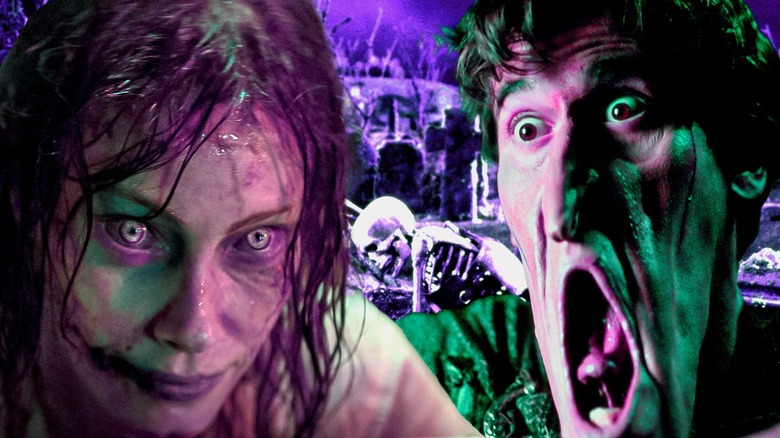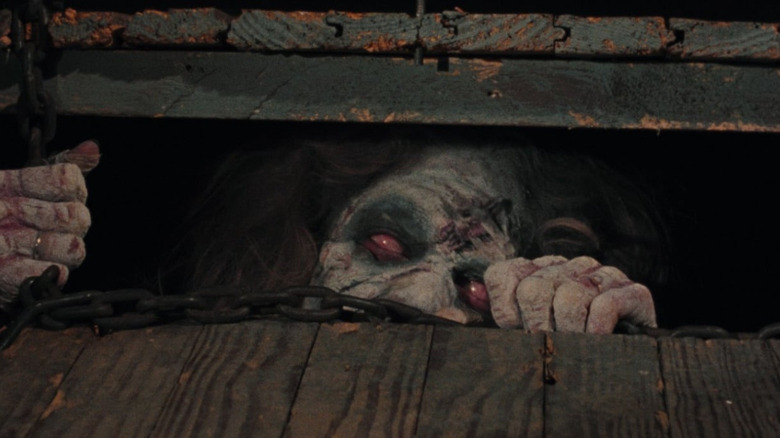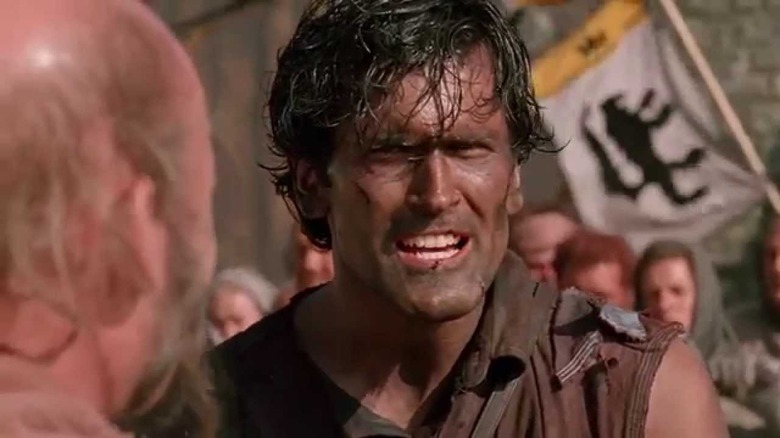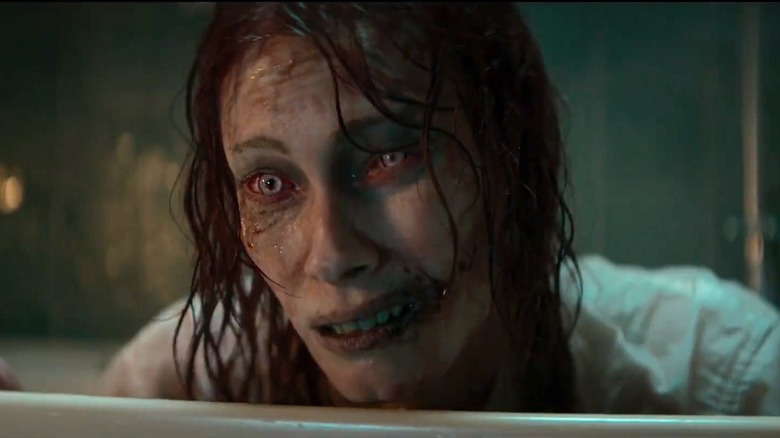Evil Dead Is Growing Up Into A Mainstream Horror Franchise (At The Cost Of Everything That Made It Great)
The "Evil Dead" saga has treated horror fans to some groovy tales of terror throughout the years, but let's take a moment to remember the inspirational real-life story that started it all. The first film, released in 1981, exists because a group of friends — director Sam Raimi, actor Bruce Campbell, and producer Robert Tapert — went into the woods with a small crew and willed their demented vision of demonic debauchery into existence. "The Evil Dead" was DIY and punk rock — and no one could have predicted what it went on to become.
While the original movie is a fairly lowkey affair about a hellish night in a cabin, it's a work of vivid imagination that boasts some big ideas. The "Necronomicon" — the evil text that summons demons to unleash chaos — teases a universe of cosmic horrors that can't be confined by the laws of time and space. This concept has been explored even further in subsequent films, TV shows, comic books, and video games.
As the "Evil Dead" franchise became more successful, Raimi and his crew's ambitions grew. By the time "Army of Darkness" rolled around in 1992, it was evident that Raimi was ready to helm the types of mainstream blockbusters he's synonymous with today. That said, ambition didn't dilute the anarchistic sensibilities that made the original "Evil Dead" movie such a breath of fresh air back in the day.
These days, the "Evil Dead" franchise is a bankable horror IP that's been reimagined for modern times. The 2013 reboot, aptly titled "Evil Dead," and the newest take, "Evil Dead Rise," are worthy of praise in their own right, but they lack the rebellious spirit, charm, and imaginative ambition of the original movies. That's a shame, because if there's one thing "Evil Dead" shouldn't be, it's basic.
The Evil Dead used to be unpredictable
"Evil Dead" was founded on the principle of pushing the envelope. The first film is a tour de force of independent filmmaking that turned the possession genre on its head, laying the foundations for all subsequent efforts. It sees Ash Williams (Bruce Campbell) and his friends get tormented in a woodland cabin after accidentally summoning demons. Cue a darkly-humored nightmare involving monsters, pencil stabbings, and diabolical trees that Stephen King described as "ferociously original horror."
The first "Evil Dead" isn't short on laughs, but "Evil Dead II" is an absolute hoot. A soft reboot, the sequel follows the same basic premise but adds more "Three Stooges"-style slapstick humor to the violent set pieces as Ash finds himself tormented by ornamental deer heads, forks, and other household appliances. It's an entirely different movie, and it showed that Raimi and co. were keen to expand both the mythology and the creative direction of the franchise.
This became more evident in "Army of Darkness," a complete left field turn that sent Ash back in time to the Middle Ages to face skeleton armies and miniature versions of himself. The movie was inspired by "Jason and the Argonauts," Arthurian literature, and old-school pulps such as "Conan the Barbarian," and it opened the door to a whole world of possibilities. Basically, "Army of Darkness" showed that there were no limits regarding what an "Evil Dead" movie could be.
"Ash vs. Evil Dead," meanwhile, made the jump to television and dug deeper into the Deadite lore. The show is a tribute to everything that came before and as a conclusion to Ash's story on the screen, it's satisfying and surprisingly heartfelt. However, the post-"Army of Darkness" franchise was originally going to push the boundaries of weirdness even further.
The Evil Dead sequels that never came to be
Sam Raimi and the gang took a long break from the "Evil Dead" franchise following "Army of Darkness." However, they didn't stop thinking about chainsaws, Necronomicons, and Deadites between then and the 2013 reboot. Some ideas for a fourth sequel were discussed during the off-season, and most of them sound pretty groovy on paper.
The big one was "Freddy vs. Jason vs. Ash," which would have pitted Bruce Campbell's boomstick-wielding everyman against the chief villains from "Nightmare on Elm Street" and "Friday the 13th." This idea was adapted as a comic book in 2007, but a movie could have been the greatest crossover event in the history of horror. The filmmakers also considered a sequel that would have followed two versions of Ash (inspired by the two very different endings of "Army of Darkness") — one in the present day and the other in post-apocalyptic England — but that idea was put to bed after Raimi decided they'd lost the plot.
It didn't stop there, either. One proposed project centered around Ash as a documentary filmmaker who wants to share his horrific story with the world. Elsewhere, "Ash vs. the Machines," aka "Army of Darkness 2," would have taken Ash to battle "Terminator"-esque robots. That project was quickly abandoned after being deemed too expensive, which is a shame, as it sounds incredible.
While some of these ideas are better than others, each of them is a testament to the original franchise's willingness to experiment and push the boundaries of creativity. Meanwhile, the movies we've had since then are more focused on revisiting familiar ground and sticking to the basics.
Evil Dead is still good, but it's lost touch with what made it special
Fede Alvarez and Lee Cronin's respective "Evil Dead" movies aren't devoid of any original ideas. 2013's "Evil Dead" is an intelligent gorefest that uses possession as a metaphor for the horrors of addiction. "Evil Dead Rise," meanwhile, brings the terror to an urban setting and subjects a single mother and her children to Deadite bullying. They're enjoyable for what they are, but the franchise has lost touch with the swing-for-the-fences mentality that made it great in the first place.
"Evil Dead" and "Evil Dead Rise" are standalone films, but they're cut from a similar cloth. In an interview with Bloody-Disgusting, Bruce Campbell noted that "Rise" is comparable to the 2013 reboot as both are serious horror and tonally similar. The setting and characters might be different in "Evil Dead Rise," but Cronin's movie doesn't do much to separate itself from the previous reboot. Both are big studio movies, after all. "Evil Dead" needs to go the safe route now, but this approach has caused the franchise to lose touch with the independent DIY spirit and uncompromising unpredictability that fans were attracted to in the first place.
The last two "Evil Dead" movies are entertaining horror outings that deliver the essentials, sure, but what happened to the element of surprise and unrepentant creativity? The saga has never shied away from trying to appeal to a mainstream audience, but it used to be about subverting expectations and experimenting with some wild concepts. The new films are scary, but the original movies had laughs, scares, and bold ideas for days. Let's hope the franchise gets back to that mindset someday, as it was more interesting when it was hell-bent on radically reinventing itself with each new release.



